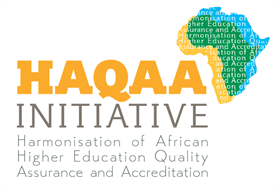PAQAF- The Pan-African Quality Assurance and Accreditation Framework, which the African Union Commission has had endorsed via its committees and its Council in 2016, is an overriding framework for a number of commitments related to quality assurance harmonisation activities in Africa. It consists of several tools and action lines, some of which have already been developed and are being utilized, others which still need to be developed:
- African Standards and Guidelines for Quality Assurance (ASG-QA) – developed in 2017-2018 under the HAQAA Initiative, consulted and pending African Union endorsement
- Continental Qualifications Framework – pending development
- African Quality Rating Mechanism (AQRM) – originally developed and African Union endorsed in 2007, revised and piloted in 2014 and in 2017
- Addis Convention for Recognition – developed, pending legal approval in many African states
- African Credit Accumulation and Transfer System – proposal has been developed by the TUNING Africa initiative, pending African Union endorsement
- Continental Register for QA agencies and quality assured higher education institutions -pending development
These tools and frameworks will eventually be safe-guarded and implemented by a Continental Accreditation Agency whose general mandate will be to coordinate, promote, and facilitate harmonisation of QA and accreditation systems in Africa. As this Agency is not yet established, certain tools of the PAQAF are currently being developed, tested and implemented by African stakeholder organisations in the higher education sector, supported by international partners like the European Union.
The African Standards and Guidelines for Quality Assurance (ASG-QA)
The ASG-QA is an overriding set of standards and guidelines that provide a baseline for the development of higher education Quality Assurance systems in Africa. They have three parts, addressing A) internal quality assurance (in institutions), B) external quality assurance (as conducted by regulatory bodies and agencies) and C) the quality assessment of those bodies conducting external quality assurance.
The ASG-QA aim to support higher education institutions and quality assurance agencies in Africa by:
- promoting good quality assurance practices and developing adequate internal and external quality assurance mechanisms and processes that fit international best practices;
- better defining and promoting the relationship between internal and external quality assurance;
- developing mutual trust between higher education agencies, regulatory bodies and institutions, thus facilitating recognition and mobility of students and human resources within and across national borders of the continent
- promoting transparency and accountability by providing appropriate information on quality assurance to the public.
The ASG-QA were developed in 2017-2018 in the context of the HAQAA Initiative and premised on existing standards and guidelines in different African countries and regions and globally. They are available in French, English, Arabic and Portuguese.
The ASG-QA invite HEI and quality assurance regulatory bodies to reflect on standards and then to look for data to be given as evidence (the HEI or the regulatory body chooses its own indicators to prove that it meets the standard). There is room for “fitness for purpose” and for different interpretations on how to measure and provide data on the achievement of the standards and guidelines.
The AQRM (see below), which is specifically a quality assessment tool for higher education institutions, is compatible with the ASG-QA, and provides one means to measure the fulfillment of the standards in Part A. The AQRM can be a means for HEI to gather evidence and assess themselves. The AQRM specially supports the implementation of Part A of the ASG-QA (as opposed to Parts B and C, which apply to quality assurance agencies and regulatory bodies). A mapping of the AQRM reference points against Part A of the ASG-QA will soon be publicly available, in order to help HEI to better understand how these two PAQAF tools relate.
The African Quality Rating Mechanism (AQRM)
Adopted by the Conference of Ministers of Education of the African Union (COMDAF) in 2007, the AQRM is a quality assessment tool for higher education institutions in Africa and one means of supporting continuous quality improvement. The self-evaluation/self-rating survey that comprises the AQRM consists of Institutional-level reference points (Governance and Management, Infrastructure, Finance, Teaching and Learning, Research, Publication and Innovation and Community Engagement) and Programme-level reference points (Programme Planning and Management, Curriculum Development, Teaching and Learning, Assessment and Programme Results). Institutions are asked to rate that themselves against standards defined under each reference point, on a scale of 1-4. In total there are 49 Institutional level standards and 35 programme level standards. It should be noted that the AQRM is not a ranking instrument for comparing institutions and is not used to create league tables.
The AQRM has been developed with the oversight of the African Union Commission (AUC) and in cooperation with higher education stakeholders and experts. The AUC supported a pilot self-rating exercise in 2010 in which 32 African institutions participated. Based on the experience and feedback gained from the pilot survey, a revised version of the AQRM questionnaire and rating instrument was developed and is now available in English, French and Portuguese.
As the AQRM should ideally be complemented with a validation visit; In 2014, a pilot cohort of nine universities participated in the self-rating exercise and received validation visits of expert teams. In 2017, the HAQAA Initiative facilitated the selection of an additional 15 universities to conduct the AQRM self-rating survey and receive verification visits by teams of African and European experts.
Currently, the AQRM survey is publicly available for any interested institutions on the website of the Association of African Universities, the implementing body of the African Union Commission for higher education (link).
Documents & Resources

